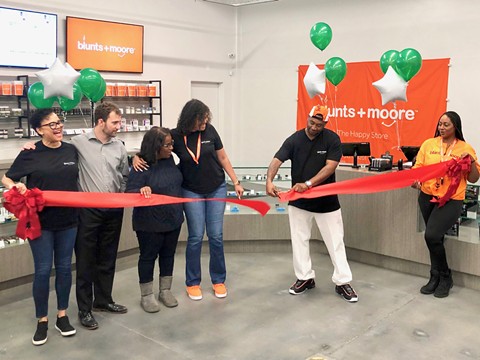At this summer’s MJ Unpacked virtual conference, business leaders and equity advocates gathered for a discussion on promoting diversity and equity in the cannabis industry. Moderated by veteran journalist Ricardo Baca, the group easily reached consensus on the problems that plague our industry’s attempts at inclusiveness. Everyone at the table agreed that government equity programs are not really opening the playing field to the communities that have been most hurt by prohibition and the war on drugs. They cited lack of oversight, education, mentors, and funding. “People that are part of the industry need to be writing the policies, because there’s a major disconnect,” said Niambe McIntosh, founder of the Peter Tosh Foundation, which advocates for legalization, prisoner reform, and equity.
“We’ve had to become activists. I came into this business to be a business owner.”
The panelists were equally critical of corporations that aren’t following through on their diversity plans. “We’ve had to become activists. I came into this business to be a business owner,” said Kika Keith, the founder of L.A.-based Life Development Group, which is dedicated to community reinvestment. “Industry insiders need to stand up, not just the people that are trying to get in,” she added. Here’s some actionable takeaways for the business community:
Acknowledge weaknesses and get help.
“Be honest with yourself,” said Alphonso “Tucky” Blunt Jr. “Take some self reflection. Look at your brands. Pull out your whole employee profile. And do whatever you need to make things equitable overall.” Arlene Mejia recommended checking out her organization Last Prisoner Project for solutions and ways to get involved. Baca, who founded the PR firm Grasslands, advised “It’s okay to acknowledge that you don’t know what you’re doing with this process. And it’s very okay to bring people in who understand this process and can help make your space more equitable.”

Get serious about hiring people from the communities that have been most hurt by prohibition.
The panelists agreed that businesses need to work harder to bring equity players to the table–and not just one or two token hires. Mejia provided a simple first step: “Everyone’s going to need a chief engagement officer, a community engagement officer. That should be from our communities.”
“It’s really looking at diversifying on every level. Not just in the stores but in the boardrooms and at the higher positions as well,” said McIntosh, who pointed out that diversifying has benefits for commerce. “It’s a proven science at this point. If it ends up needing to come down to the bottom line…If you diversify your organization, you’re able to connect with a lot more individuals. And you have a voice and a mind that has had a very unique experience that can be a major asset to your organization.”
Blunt agreed that going big with diversity in hiring is key to holding ourselves accountable. “Get real about this,” he said. “It’s bigger than just a flyer or Instagram post or Black Lives Matter post. What y’all going to be doing in one year, two years? Are you still going to be shouting that out? Nah, I doubt it. But if you’ve got somebody’s that’s really part of your [organization] who is stepping that up and making it real? You will be.”
“If you really want that change, you got to be that change,” Blunt added. He lives by example. Convicted of a felony for selling cannabis, Blunt was the first person to open a dispensary under Oakland’s equity program. With his partner Bri Moore, he opened Blunts & Moore in 2018. He’s now proud to be a fifth generation native son of Oakland, selling cannabis legally and hiring at least 75% equity candidates. “Come look at my staff,” he said. “And come see how we roll in the bay—how we have a community store. Weed is supposed to be a community.”
Highlight equity brands.
“Dedicate shelf space to equity brands,” said Kika Keith. “Highlight them. It’s a simple process. You’ll support the economic growth of these individuals and their communities.”
Cooperate on message.
The panel agreed that creating a community of color within the industry is essential to our strength, as is cooperation between activists and industry. In the words of Arlene Mejia: “Cannabis brands and community leaders should work together to create clear messaging.”
Be a mentor.
Kika Keith stressed that conversation with an industry insider can make all the difference for first time business owners, and is essential to speeding up the process and opening doors to diverse players. “We need mentorship. A 30 minute phone call will change you. Commit to three hours a month to get on Zoom calls, to get one-on-one.”
Be a voice.
“This is a white male dominated industry that has been made on the backs of our people. And there has to be a point where we say stop,” said Kika Keigh. “From the politicians to the industry as a whole, we need to start saying: Listen, from a human rights perspective, we have to do better! And we have to do this right. And although we have policies on paper, we must start to implement them. As an industry we have to demand it.” In conjunction, Niambe McIntosh stressed the importance of white participation. “Be a voice,” she said. “Not just an ally who says ‘I’m an ally,’ but really learn to use your voice in parallel with ours.” Baca agreed and left us with important parting words: “You can’t just say you’re an ally without taking action.”





1 thought on “How to be an ally: Key takeaways from the diversity summit at MJ Unpacked”
Pingback: Retail Insights: Tucky Blunt Jr. keeps the old school vibe alive at Oakland's Blunts+Moore - MJ Brand Insights